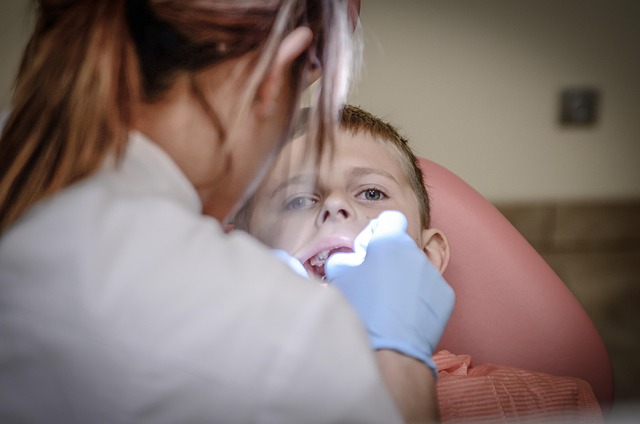Dr. Cazares: Brighter Smiles, Brighter McAllen

Dr. Cazares, a top dentist in McAllen, offers natural, holistic dentistry with advanced technology……..
In the rapidly evolving landscape of modern healthcare, “Dr Casares” has emerged as a transformative concept, revolutionizing patient care and medical practices worldwide. This article aims to delve into the intricate world of Dr Casares, exploring its definition, global impact, economic implications, technological advancements, regulatory frameworks, challenges, and future prospects. By providing an in-depth analysis, we will equip readers with a holistic understanding of this influential phenomenon and its potential to shape healthcare’s tomorrow.
Definition: Dr Casares is a revolutionary medical approach that integrates advanced technologies, data analytics, and personalized care to optimize patient outcomes. It involves the comprehensive management of patient health through a seamless integration of electronic health records (EHRs), telemedicine, artificial intelligence (AI), robotics, and precision medicine.
Core Components:
Electronic Health Records (EHRs): The digital repository of a patient’s medical history, lab results, medications, allergies, and immunization records. EHRs serve as the central hub for accessing and sharing patient data among healthcare providers.
Telemedicine: A remote healthcare delivery model that utilizes technology to connect patients with healthcare professionals over video conferencing, phone calls, or secure messaging apps. Telemedicine expands access to medical services, especially in underserved areas.
Artificial Intelligence (AI): AI algorithms analyze vast amounts of patient data to identify patterns, predict health risks, and support clinical decision-making. Machine learning models can assist in diagnosing diseases, personalizing treatment plans, and improving overall efficiency.
Robotics: Robotic systems are employed for surgical procedures, providing enhanced precision, reduced invasiveness, and improved recovery times. Robots also assist in administrative tasks, such as medication management and patient monitoring.
Precision Medicine: This approach tailors medical treatments to individual genetic profiles, considering variations in DNA that may affect a person’s response to drugs or the progression of diseases.
Historical Context: The concept of Dr Casares has evolved over several decades, driven by advancements in information technology and a growing recognition of personalized medicine. The early 2000s saw a surge in electronic health record adoption, while the last decade witnessed the integration of mobile health (mHealth) apps and wearable devices. The COVID-19 pandemic further accelerated the adoption of telemedicine, underscoring its potential to bridge healthcare access gaps.
Dr Casares has left an indelible mark on healthcare worldwide, with varying degrees of implementation across regions:
| Region | Adoption Level | Key Drivers | Challenges |
|---|---|---|---|
| North America | High | Robust digital infrastructure, early adopters in tech innovation, and a well-established healthcare system. | Privacy concerns related to data security and patient consent. High costs associated with implementing and maintaining advanced technologies. |
| Europe | Moderate to High | Strong emphasis on patient rights and data privacy laws, such as GDPR. Increasing investment in digital health initiatives. | Regional variations in healthcare systems and regulatory frameworks present implementation challenges. |
| Asia-Pacific | Growing | Rapidly growing middle class and increased demand for accessible, affordable healthcare. Governments investing in digital health infrastructure. | Infrastructure gaps in rural areas, data privacy concerns, and resistance to change due to traditional healthcare practices. |
| Latin America | Low to Moderate | Emerging markets with a focus on improving healthcare access. Increasing mobile penetration rates. | Limited digital infrastructure, insufficient investment in healthcare technology, and regulatory hurdles. |
| Middle East & Africa | Varies | Some countries investing heavily in modernizing healthcare systems, while others face resource constraints. | Data privacy and security remain concerns, especially in regions with less developed legal frameworks. |
Trends Shaping Dr Casares:
Digital Health Literacy: Growing acceptance of digital health technologies as a result of increasing internet penetration and smartphone usage.
Telehealth Expansion: The COVID-19 pandemic has led to a rapid scaling up of telemedicine services, making it an integral part of healthcare systems worldwide.
AI in Diagnosis and Treatment: Machine learning algorithms are becoming more sophisticated, enabling early disease detection and precision treatment approaches.
Wearable Health Devices: Increasing popularity of fitness trackers and health monitoring wearables, providing real-time data for personalized care.
Remote Patient Monitoring (RPM): RPM allows healthcare providers to track patient vital signs and health status remotely, enabling timely interventions.
The implementation of Dr Casares has significant economic implications, influencing both healthcare delivery and the broader economy:
Market Dynamics: The digital transformation of healthcare is creating new market opportunities for technology providers, telemedicine platforms, AI developers, and robotic manufacturers. This shift is driving innovation and competition in the healthcare sector.
Investment Patterns: Governments and private investors are allocating substantial funds to digital health initiatives. According to a report by McKinsey (2021), global digital health investments reached $47 billion in 2020, with AI and data analytics being key areas of focus.
Cost Savings and Efficiency: Dr Casares has the potential to reduce healthcare costs by minimizing redundant tests, streamlining workflows, and enabling early disease management. For example, a study published in The Lancet Digital Health (2022) found that telemedicine consultations resulted in significant cost savings for both patients and healthcare systems.
Revenue Generation: New revenue streams are emerging, such as subscription-based digital health platforms, remote patient monitoring services, and data analytics-driven insights. Telemedicine, particularly in specialized areas like mental health and chronic disease management, offers additional revenue opportunities.
Technological innovations are at the heart of Dr Casares’ success and evolution:
Artificial Intelligence (AI): Advanced AI algorithms power various aspects of Dr Casares. Natural Language Processing (NLP) enables efficient data extraction from clinical notes and patient reports. Machine learning models predict disease progression, identify at-risk patients, and support treatment decisions. Deep learning algorithms enhance image analysis for diagnostic accuracy.
Robotics: Surgical robots assist in minimally invasive procedures, improving precision and reducing surgical time. Telepresence robots enable remote patient interactions, while mobile robots handle administrative tasks, improving overall efficiency.
Internet of Medical Things (IoMT): Wearable devices, smart sensors, and connected medical equipment generate real-time health data, enabling continuous monitoring and early intervention. IoMT devices include fitness trackers, glucose monitors, and smart inhalers.
Blockchain Technology: Blockchain has the potential to revolutionize data sharing and security in Dr Casares. It ensures secure, transparent, and tamper-proof storage of patient records, streamlining data exchange between healthcare providers.
5G Networks: The rollout of 5G technology promises faster data transfer rates, enabling real-time streaming of medical images and remote surgical procedures. This advancement is crucial for the future of telemedicine and remote surgery.
The rapid pace of technological advancements in Dr Casares has led to a corresponding evolution in healthcare policies and regulations:
Data Privacy and Security: Ensuring patient data privacy and security is a global priority. Laws like the General Data Protection Regulation (GDPR) in Europe, the Health Insurance Portability and Accountability Act (HIPAA) in the US, and the Personal Data Protection Act (PDPA) in Asia set guidelines for data handling and storage.
Telemedicine Regulations: Many countries have introduced policies to promote and regulate telemedicine practices. These include licensing requirements, reimbursement policies, and guidelines for remote patient monitoring. For instance, the World Health Organization (WHO) has provided recommendations for integrating telemedicine into national health systems.
AI in Healthcare: Regulatory bodies are grappling with the unique challenges of AI in healthcare. The US Food and Drug Administration (FDA) has established guidelines for AI-based medical devices, emphasizing safety and efficacy. Europe’s Artificial Intelligence Act outlines legal frameworks for AI systems, including risk assessment and transparency requirements.
Standardization and Interoperability: Efforts are underway to develop standards for data exchange and interoperability between different healthcare systems and technologies. This ensures that patient data can be seamlessly shared, improving care coordination. HL7 FHIR (Fast Healthcare Interoperability Resources) is a widely adopted standard for exchanging clinical information electronically.
Despite its immense potential, Dr Casares faces several challenges and criticisms:
Digital Divide: Access to digital health technologies is not uniform, with disparities between rural and urban areas, developed and developing countries, and different socio-economic groups. This digital divide risks excluding certain populations from the benefits of Dr Casares.
Data Security and Privacy: As healthcare data becomes increasingly digitized, the risk of data breaches and unauthorized access increases. Ensuring patient privacy and securing sensitive health information is a constant concern.
Interoperability Issues: Different healthcare systems and technologies often lack interoperability, making it challenging to share and integrate patient data seamlessly. This fragmentations hinders comprehensive care coordination.
Regulatory Complexity: Navigating the complex web of regulations and policies related to Dr Casares can be cumbersome for healthcare providers and technology developers. Compliance requirements vary across regions, adding administrative burdens.
Cost and Resource Allocation: Implementing and maintaining advanced technologies in healthcare can be expensive. There is a need for strategic investments and resource allocation to ensure equitable access to Dr Casares without straining healthcare budgets.
Case Study 1: Telemedicine for Rural Communities in India
In a remote village in India, a non-profit organization implemented a telemedicine platform to connect local residents with healthcare professionals located in urban centers. The program offered virtual consultations, diagnostic services, and health education. Results showed improved access to healthcare, reduced travel costs, and faster time to diagnosis for rural patients. This initiative demonstrated the potential of Dr Casares to bridge healthcare gaps in underserved regions.
Case Study 2: AI-driven Diabetes Management in the US
A major US healthcare provider utilized machine learning algorithms to develop a personalized diabetes management program. The AI system analyzed patient data, including glucose levels, diet, and physical activity, to provide tailored treatment plans. This approach led to significant improvements in blood sugar control and reduced the risk of complications among participants. The study highlighted the effectiveness of AI in precision medicine applications.
Case Study 3: Robotic Surgery for Pediatric Patients
A leading children’s hospital adopted robotic surgery systems to perform minimally invasive procedures on pediatric patients. The robots provided enhanced surgical precision, enabling surgeons to perform complex operations with smaller incisions. This approach reduced recovery times and minimized post-operative pain for young patients. The case study demonstrated the benefits of robotics in improving patient outcomes and enhancing surgeon capabilities.
The future of Dr Casares is poised for further growth and innovation, driven by emerging trends and technological advancements:
Personalized Medicine on a Global Scale: AI and genomics will enable more precise disease prediction, prevention, and treatment tailoring at a population and individual level.
Remote Patient Monitoring (RPM) Expansion: RPM will continue to grow, with advanced wearables and IoT devices providing continuous health data streaming, enabling timely interventions and improved chronic disease management.
Virtual Reality (VR) and Augmented Reality (AR) in Healthcare: VR and AR technologies will enhance medical training, patient education, and remote therapy sessions, creating immersive healthcare experiences.
5G and Edge Computing: The integration of 5G networks and edge computing will enable real-time data processing and analysis, supporting advanced applications like remote surgery and AI-assisted diagnostics.
Healthcare Data Analytics Market Growth: The market for healthcare analytics is projected to reach $34 billion by 2026, driven by the increasing volume of health data and the need for actionable insights. Advanced analytics will enable predictive modeling, resource optimization, and improved patient outcomes.
Dr Casares represents a transformative force in healthcare, leveraging technology to improve patient care, enhance operational efficiency, and reduce costs. As the world navigates the digital age, this concept has become a cornerstone of modern healthcare systems worldwide. Despite challenges, the potential benefits are compelling, offering improved access, personalized treatments, and better health outcomes.
The future prospects for Dr Casares are promising, with emerging technologies poised to further revolutionize healthcare delivery. As we continue to explore and refine these innovations, it is crucial to address ethical considerations, ensure data privacy, and foster collaboration among stakeholders to shape a sustainable and inclusive healthcare landscape.
Q: How does Dr Casares improve patient care?
A: Dr Casares enhances patient care through personalized treatment plans, improved diagnostic accuracy, faster access to medical expertise (via telemedicine), and continuous health monitoring (remote patient monitoring). Integrated technology enables healthcare providers to make data-driven decisions, leading to better outcomes.
Q: What are the potential risks of AI in healthcare?
A: AI in healthcare carries risks such as algorithmic bias, where biased data or algorithms may lead to inaccurate predictions or treatment recommendations. Data privacy and security are also concerns, as AI systems require access to sensitive patient information. Robust testing, transparency, and ethical guidelines are essential to mitigate these risks.
Q: Can Dr Casares reduce healthcare costs?
A: Absolutely. Dr Casares has the potential to reduce costs by streamlining workflows, minimizing redundant tests, and enabling early disease management. Telemedicine consultations, for instance, can lower administrative expenses and patient travel costs. Efficient data sharing and improved diagnostics also contribute to cost savings.
Q: How does Dr Casares address healthcare disparities?
A: While Dr Casares offers numerous benefits, addressing healthcare disparities requires a multi-faceted approach. Implementing this concept in underserved areas, ensuring digital literacy programs, and providing affordable access to technology are crucial steps. Telemedicine and remote monitoring can bridge geographical gaps, while policy interventions should aim to reduce socio-economic inequalities in healthcare access.
Q: What role does patient data privacy play in Dr Casares?
A: Patient data privacy is a top priority in Dr Casares. Strict regulations, such as GDPR and HIPAA, govern the handling of sensitive health information. Secure data storage, encryption techniques, and access controls ensure that patient data remains confidential. Healthcare organizations must prioritize data security to build trust with patients and comply with legal frameworks.

Dr. Cazares, a top dentist in McAllen, offers natural, holistic dentistry with advanced technology……..

In today’s diverse social landscape, creating inclusive spaces where every family feels welcomed is…….

Dr. Joey Cazares, McAllen, TX, is a top cosmetic dentist offering personalized smile makeovers using…….

In the realm of oral health, building trust is as essential as any dental procedure. McAllen residen…….

Dr. Cazares offers comprehensive dental care in McAllen, emphasizing compassionate, holistic practic…….

In the realm of historical preservation, the meticulous restoration of artifacts and structures is a…….

Dr Casares Naturally prioritizes preventive dentistry through regular checkups, personalized hygiene…….

Uninsured patients often face significant challenges when it comes to accessing the medical care the…….